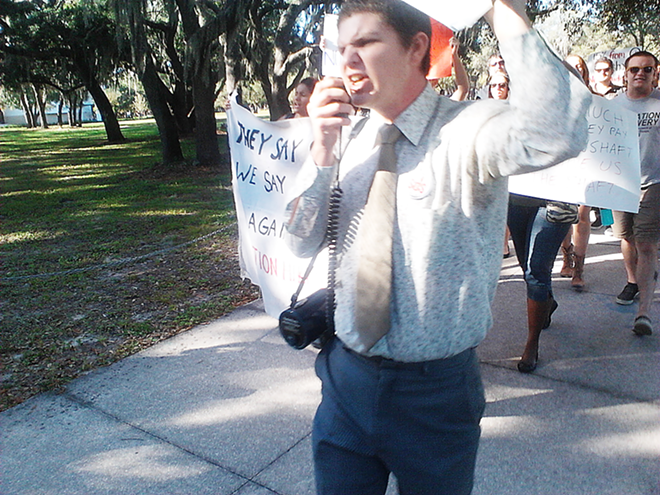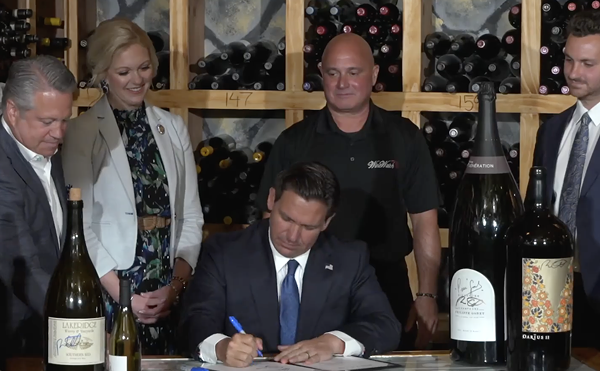
In the last decade, there’s been only a handful of significant student demonstrations at USF. But last November, in a scene that could have come from a documentary of campus activity during the late 1960s, several dozen students, some affiliated with the group Students for a Democratic Society (the most radical student organization of that era), held a rally in front of Cooper Hall on the Tampa campus. They then began marching to the Patel Center, the administration building that houses the office of school president Judy Genshaft.
Chanting “Judy got paid off, we got ripped off,” the students, inspired by the Occupy movement, were protesting the gap between Genshaft’s annual salary (which at a base of $400,700 puts her in the top 10 percent of her colleagues in the country) and the rise in tuition costs — 15 percent annually at all state universities, with the possibility of increases continuing into the next decade.
But despite the revolutionary rhetoric in the air, the tension was defused when the students arrived at the Patel Center, where they were greeted by a smiling Dwayne Smith, along with a coterie of administration officials. USF’s senior vice provost played the genial host, substituting for Genshaft (who that day was dealing with a Board of Governors meeting on whether to allow USF-Polytechnic in Lakeland to go independent), and the presumptively warring bodies held a respectful give-and-take that lasted for 90 minutes.
The most recent rate hikes occurred after the Board of Governors and USF Board of Trustees authorized a tuition increase of 7 percent on top of an increase of 8 percent approved by the State Legislature in May, increasing the average full-time student’s tuition bill by approximately $600 a year. It was the third straight year of such an increase, and the fourth year of at least 14 percent.
Angered by these increases, many of the students who marched in USF last fall are planning to stage a protest in Tallahassee next week when the FL Legislature opens its next session.
The problem is, these students are getting a bargain, at least compared to the rest of the country. Tuition at Florida’s public universities now ranks 45th nationally, with an average of $4,886 per year. At USF it’s $5,626 annually; nationwide, in-state tuition and fees at four-year public universities average $8,244, says the College Board.
USF junior Dani Leppo says she understands tuition is lower here than virtually everywhere else, but says “we’re low everywhere else in terms of cost of living.” She laments that working-class families, first-generation college students and people who don’t have support systems are being left out in the cold in terms of getting a college education.
But Governor Rick Scott and the state Legislature don’t particularly want to hear about it.
Daytona Beach GOP state Senator Evelyn Lynn, who chairs the Budget Subcommittee on Higher Education Appropriations, can only be sympathetic to a point. She says that over the years students have asked her that fees be included to pay for programs like transportation and green initiatives. That may not mean they want tuition increased, but the senator doesn’t see it that way. “That’s not the position that these students have presented to me over the years.”
Tico Perez, who serves as the chairman of the Budget Committee on the state Board of Governors, is emphatic that “nobody wants to raise tuition. If we could deliver or continue to offer quality education without raising tuition, we would be thrilled to do that, but that’s not the case.”
But some state lawmakers have explicitly stated that they want FL state schools’ tuition to be raised. St. Augustine House Republican Bill Proctor proposed in a letter last summer that up to three state universities be allowed a “major increase in tuition [more than 15 percent] in order that these institutions might attain the national tuition average at an earlier date.” University of Florida President Bernie Machen has publicly discussed 30 percent rate hikes.
St. Petersburg House Democrat Rick Kriseman acknowledges that university students have been getting a deal, and that the low tuition can threaten a university’s bottom line: “My concern is I don’t want to see us losing quality professors.” Still, he says, it’s a difficult balance in tough economic times.
Educators, students and Tallahassee Democrats all believe that the state Legislature, which has been firmly in Republican hands for over 15 years now, deserves more of the blame for the university system’s budget woes than low tuition rates.
Nine days after their confab with administrators in November, USF members of Students for A Democratic Society met again with them for a follow-up on their demands (which also included that Board of Trustees meetings regarding finance be held only when a quorum of two thirds of students were on campus; that a union neutrality and card check clause be implemented for any contracts with food service employees; and that a contract with food service vendors include a commitment for 20 percent “real food” that is locally based by 2020). At that time, administrators brought out USF student body officials who supported the most recent hike to talk turkey with their college classmates.















